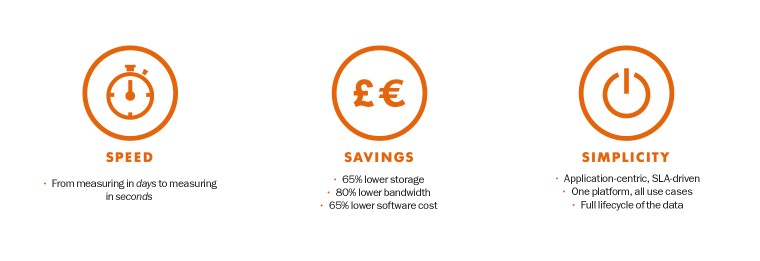As terabytes turn into petabytes, the surge in data quantities has sent costs spiralling. Even hard-drive makers are warning the crunch point is only months away. At this current rate of production, by 2016 the world will be producing more digital information than it can easily store. By 2020, we can predict a minimum capacity gap of over six zettabytes – nearly double all the data that was produced in 2013.
Just look at that mismatch between data and storage. For reference, one zettabyte would fill the storage on 34 billion smartphones.
It’s worth looking at why the problem exists: the proliferation of multiple data copies. Consumers make many copies of data on back-up drives, multiple devices and cloud storage. Businesses are worse because of the need to maintain copies for application development, regulatory compliance, business analytics and disaster protection. IDC reports 60 per cent of all corporate disk storage is allocated to copies of primary-source data.
With Actifio there is a single version of the data, which is virtualised for all other requirements
Thinking of this size financially, Gartner advise IT spend is between 1 and 7 per cent of business revenue, depending on the industry, and that storage and data management is on average 20 per cent of that figure. It’s clear to see how the FTSE 100 companies are spending a huge amount on the proliferation of copy data. Copies are increasing five times faster than primary data and IDC currently values the copy data market at $44 billion.
Typical companies now deal with ten to one hundred and twenty duplicate copies of data, meaning they are spending five times more on the infrastructure management for the copies than on the original data. Hardware, software, space, energy, people and time – it’s unsustainable, undesirable, but fortunately easily fixed.
Actifio is an expert in the data-management market, solving the entire problem of “data-bloating”. With Actifio there is a single version of the data, which is virtualised for all other requirements.
Companies such as VMware help servers perform more efficiently by using virtualisation. Actifio is bringing the same performance leap to data management, cutting storage costs by 80 per cent. The business case is so strong, Actifio was valued at more than $1 billion when raising $100 million in Round D investment.
The main reason data gets copied is that multiple business functions and regulators need access to it at the same time. For example, product designers, test and development teams, back-up administrators, finance departments, data-analytics teams, marketing, sales and more all require data.
The old model is to make physical copies of the original files and send them to every party. It becomes a main activity of the IT team to create, distribute and manage the dozens of copies flying around the enterprise. Actifio cuts through this by creating one single physical copy of the primary data and offering instant access using virtualisation. Network strain is eliminated and IT staff time managing the data is slashed, freeing them to concentrate on more business-focused activities.
Actifio transforms data management by applying data virtualisation. As a net result, data recovery is faster and when it’s complete you know you’ll have the latest version. A further bonus is the saving made in data-management licences. Companies pay for large numbers of back-up agents, de-duplication software and WAN (wide area network) optimisation tools. End the need to copy data and you end the need for those licences.
For businesses of all sizes, agility is the new objective when the discussion around how to deal with data deluge arises, whether that translates to time to market, accelerated application development or faster decision-making. True agility enables organisations to think clearly, gain insight and draw informed conclusions. Transforming physical data to virtual data provides the power to move quickly. Data virtualisation creates flexible and agile infrastructure for the immediate data access that is so central to exceptional business success.
Actifio was founded in 2009 by chief executive Ash Ashutosh to crack the copy data storage problem. The company now helps customers in more than 36 countries. The goal was to help companies save on storage, on computing equipment and on software licences. The benefits have stretched far beyond that. Actifio is set to change the way companies of all sizes think about managing their data.
CASE STUDIES
Various case studies show the impact Actifio can have on enterprises. Take hospitality technology company Newmarket International, based in Kingston-upon-Thames. It was struggling to move data between its Portsmouth and Boston data centres. Back-up involved IT staff putting data on tape and removing the tape from the building each night.
With 12 applications to support and a move to cloud services for clients, it opted for a 12-month proof-of-concept trial with Actifio. The results: a 93 per cent reduction in storage needs. Back-up speed was improved from eight hours to one hour and the data restored was guaranteed to be no older than 30 minutes. Under the previous system the data could be up to 24 hours old. Copies for tests could be made in hours, rather than days.
Newmarket International’s Ken Wilson says: “From a product perspective, Actifio is easy to use, easy to set up and easy to operate on a daily basis.”
Audax, a premier investor in middle-market companies from the financial services, were handling extremely large data pools that needed to be staged, shared, examined, managed and protected. Audax needed cost-effective flexibility, simplicity and scale. The results: significant cost reductions as much as 75 per cent over five years.
“Actifio is the first solution robust enough to handle any type of data management need, and elegant enough to allow the business to define service level agreements, then click auto-pilot and the technology just works,” says Erik Dubovik, Audax Group’s vice president of IT.
For more details please visit www.actifio.com or contact info@actifio.com

CASE STUDIES

